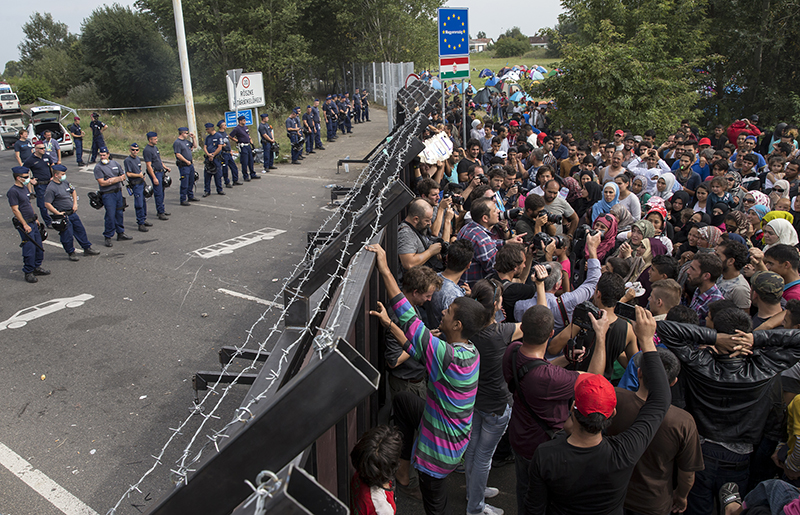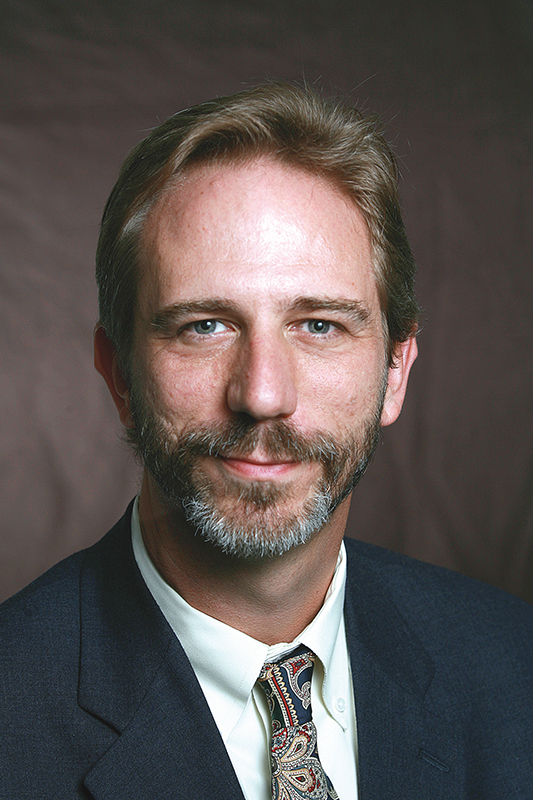
Migrants stand in front of a barrier at the border with Hungary near the village of Horgos, Serbia, on September 16, 2015. Photo courtesy of REUTERS/Marko Djurica
*Editors: This photo may only be republished with RNS-GUSHEE-COLUMN, originally transmitted on September 16, 2015.
(RNS) Western claims to stand for human dignity and human rights usually look pretty hollow whenever a major refugee crisis hits. That is what is happening now, as millions of refugees seek asylum in Europe — and mainly run into closed doors and cold shoulders.
The current crisis is a grave one. According to Amanda Taub, 19 million people today are refugees. They come from all over, though today especially from Africa and the Middle East. Four million have fled Syria since 2011. They are making global headlines as they surge into Europe, which is for many just the latest stop on a desperate odyssey.
They are dying in disturbing numbers — in rickety boats, sealed trucks and squalid refugee dumping grounds. They are not wanted where they come from and not wanted where they are going.
READ: US advocates for Syrian refugee resettlement find unexpected allies
The post-World War II world order was predicated on a global commitment to “never again” allow the mass violation of human dignity and human rights that the world had just witnessed. The very first line of the 1948 Universal Declaration of Human Rights reads:
“Recognition of the inherent dignity and of the equal and inalienable rights of all members of the human family is the foundation of freedom, justice, and peace in the world.”
Article 14 says “Everyone has the right to seek and to enjoy in other countries asylum from persecution.”
READ: Obama wants 10,000 Syrian refugees next year
Articles 15 says: “No one shall be arbitrarily deprived of his nationality nor denied the right to change his nationality.”
Fine words.
But they beg these questions: Which particular “other countries” are obligated to provide said asylum from persecution? Which particular other countries have an obligation to welcome people desperately desiring to change their nationality?
Not in my backyard. Not my problem. In Europe, with the noble exception of Germany, that pretty much summarizes the answer. As for the United States, we have been missing in action as well. Not our problem. After all, we haven’t yet deported the 11 million “illegals” we already have on our hands, right?
Here is the thing about human rights, one of the foundational concepts of the postwar world. They are so elegant, so expansive, so wonderful. Just read the Universal Declaration of Human Rights. It’s a beautiful statement. Bring a tissue.
But rights imply duties. If I have a genuine right to X, someone has a duty to provide X. If I have a right to a free K-12 education for my children, someone has a duty to provide it. If I have a right to marry the person of my choice, no one can be permitted to block me.
The modern world has seen the shift of almost all such perceived compulsory duties into the hands of the nation-state. If I have a genuine right to something, almost always it is the state that either provides it or bans itself or others from preventing me from obtaining it.
READ: Pope Francis: Every parish in Europe ‘take in one refugee family’
But refugees are between states. They have no state, they have left a hostile state or they have arrived at the borders of a state that they are not permitted to enter. As legal scholar Jeremy Waldron has noted, there is a connection between citizenship and dignity. Serious recognition of the latter seems to depend on recognition of the former.
But this seems to end up meaning: If you are not a citizen you have no dignity and no rights that anybody in particular is obligated to recognize.
This is not the way the postwar world saw itself operating, a world awash in refugees. But it is the world we live in.

The Rev. David Gushee is Distinguished University Professor of Christian Ethics and director of the Center for Theology and Public Life at Mercer University. Photo courtesy of Mercer University
Where there are no enforceable rights, everything depends on moral pressure and national moral altruism. It depends on religious, moral, political and civil society voices simply demanding that these particular desperate human beings at the border be treated as if we have an obligation to them. That is precisely what Pope Francis was trying to say when he demanded that every parish in Europe’s Catholic Church offer refuge. It’s what World Relief leader Stephan Bauman was saying when calling for the U.S. to offer welcome to 200,000 refugees right now.
Nobody can make others, or us, do the right thing. Nobody can make us overcome our indifference and inertia and nativism.
That makes the global refugee crisis a very stern moral test for us, our country and for the entire world.
(The Rev. David Gushee is Distinguished University Professor of Christian Ethics and director of the Center for Theology and Public Life at Mercer University. He is the author or editor of 20 books in his field, including “Kingdom Ethics,” “The Sacredness of Human Life” and “Changing Our Mind.”)
LM/MG END GUSHEE




